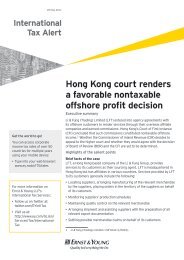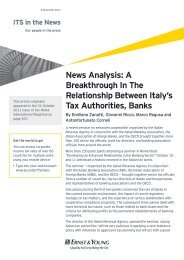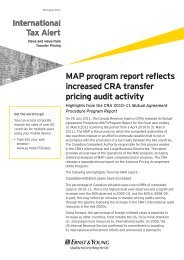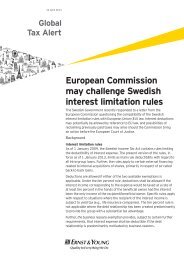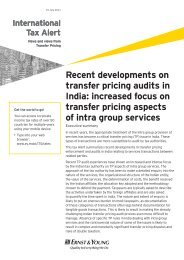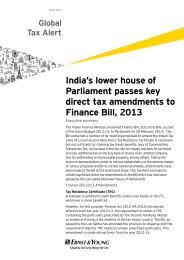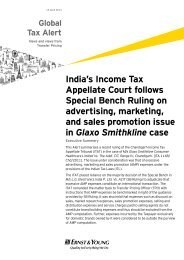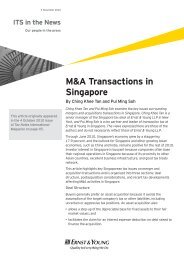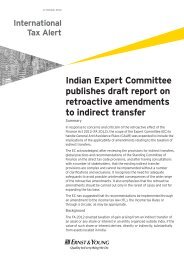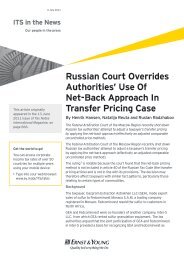(C-397/09) regarding the add-back - Ernst & Young T Magazine
(C-397/09) regarding the add-back - Ernst & Young T Magazine
(C-397/09) regarding the add-back - Ernst & Young T Magazine
You also want an ePaper? Increase the reach of your titles
YUMPU automatically turns print PDFs into web optimized ePapers that Google loves.
Issue 167 / May 2011<br />
EU tax alert<br />
Advocate General’s Opinion in <strong>the</strong> Scheuten<br />
Solar Technology case (C-<strong>397</strong>/<strong>09</strong>) <strong>regarding</strong><br />
<strong>the</strong> <strong>add</strong>-<strong>back</strong> of interests provision in <strong>the</strong><br />
German municipal trade tax law<br />
On 12 May 2011, Advocate General (AG) Sharpston delivered her Opinion<br />
in <strong>the</strong> Scheuten Solar Technology (Scheuten) case, which concerns <strong>the</strong><br />
<strong>add</strong>-<strong>back</strong> of 50% of <strong>the</strong> interests of long-term liabilities for German trade<br />
tax purposes. As <strong>the</strong> payment of interests from a German subsidiary to its<br />
100% parent company in <strong>the</strong> Ne<strong>the</strong>rlands leads to an <strong>add</strong>itional amount of<br />
trade tax, it was questioned whe<strong>the</strong>r this provision was at odds with <strong>the</strong> EU<br />
Interests and Royalties Directive (IRD).<br />
However, in her Opinion, AG Sharpston reached <strong>the</strong> conclusion that<br />
<strong>the</strong> IRD does not preclude a provision under which loan interest paid by<br />
a company located in one Member State to an associated company of<br />
ano<strong>the</strong>r Member State is <strong>add</strong>ed to <strong>the</strong> basis of assessment to <strong>the</strong> trade tax<br />
for <strong>the</strong> former company.<br />
Argument of Scheuten and assessment<br />
of AG Sharpston<br />
Scheuten argued that <strong>the</strong> effect of <strong>the</strong> IRD<br />
is to remove any charge to tax whatsoever<br />
upon interest payments made by <strong>the</strong> payer<br />
of interest. The effect of <strong>the</strong> national rule<br />
in question is, however, equivalent to <strong>the</strong><br />
imposition of a charge to tax, since 50% of<br />
<strong>the</strong> interests is included in Scheuten’s basis<br />
of assessment to tax.<br />
This argument was rejected by<br />
AG Sharpston who stated that <strong>the</strong><br />
exemption of Art. 1 IRD is not triggered by<br />
a determination of <strong>the</strong> basis of assessment<br />
to tax but by a charge to tax. There would<br />
be nothing fur<strong>the</strong>r in <strong>the</strong> wording of <strong>the</strong><br />
IRD to suggest that <strong>the</strong> legislature wished<br />
to introduce rules concerning <strong>the</strong> basis of<br />
assessment to tax. As <strong>the</strong> relevant national<br />
rule refers to <strong>the</strong> determination of <strong>the</strong> basis<br />
of assessment to tax, and does not establish<br />
a charge to tax, <strong>the</strong> present matter falls<br />
outside <strong>the</strong> scope of <strong>the</strong> IRD.<br />
In this context, Scheuten’s argument<br />
<strong>regarding</strong> <strong>the</strong> wording and workings of<br />
<strong>the</strong> IRD did also not convince <strong>the</strong> AG.<br />
Scheuten argued that <strong>the</strong> wording of <strong>the</strong><br />
IRD concerning <strong>the</strong> scope of effected taxes<br />
is much more comprehensive than <strong>the</strong><br />
wording of <strong>the</strong> Parent-Subsidiary Directive<br />
(PSD). Therefore, <strong>the</strong> <strong>add</strong>-<strong>back</strong> of interest<br />
could also be covered by Art. 1 para 1<br />
IRD, which includes “any taxes imposed<br />
on those payments in that State, whe<strong>the</strong>r<br />
by deduction at source or by assessment”<br />
while Art. 5 para 1 PSD restricts its effect<br />
on withholding taxes (“Profits which a<br />
subsidiary distributed to its parent company<br />
shall […] be exempt from withholding tax”).
AG Sharpston, however, held <strong>the</strong> view that <strong>the</strong> words “or by assessment” simply refer<br />
to a particular mechanism for establishing a tax liability. From <strong>the</strong>se words, it cannot be<br />
concluded that <strong>the</strong> IRD is concerned with <strong>the</strong> basis of assessment of <strong>the</strong> company paying<br />
<strong>the</strong> interest. Thus, <strong>the</strong> difference in terminology between <strong>the</strong> IRD and <strong>the</strong> PSD does not<br />
lead to <strong>the</strong> conclusion that both <strong>the</strong> beneficial owner and <strong>the</strong> payer of <strong>the</strong> interest fall<br />
within <strong>the</strong> scope of <strong>the</strong> exemption in Art. 1 IRD. According to AG Sharpston, <strong>the</strong> IRD only<br />
refers to <strong>the</strong> beneficial owner of <strong>the</strong> interest and not to <strong>the</strong> payer of <strong>the</strong> interest or to<br />
whe<strong>the</strong>r <strong>the</strong> interests are tax deductible from <strong>the</strong> debtor’s basis of assessment to tax.<br />
Fur<strong>the</strong>r, Scheuten argued that an economic double taxation takes place and <strong>the</strong> economic<br />
double taxation is covered by <strong>the</strong> IRD. In this context, Scheuten referred to <strong>the</strong> justifications<br />
of <strong>the</strong> Directive. As <strong>the</strong>se point out <strong>the</strong> needs of a Single European Market, not only <strong>the</strong><br />
juridical double taxation but also <strong>the</strong> economic double taxation is necessarily covered by<br />
<strong>the</strong> IRD.<br />
In <strong>the</strong> case at hand, an economic double taxation takes place, because one economic<br />
process (payment of interests) is taxed in two countries (Germany: trade tax, Ne<strong>the</strong>rlands:<br />
corporate income tax) in <strong>the</strong> same period of time. Therefore, Scheuten argues that <strong>the</strong><br />
<strong>add</strong>-<strong>back</strong> of interests for trade tax purposes effects an economic double taxation that is<br />
covered by <strong>the</strong> Directive.<br />
That view was not shared by AG Sharpston. In her Opinion, she stated that <strong>the</strong> IRD only<br />
covers <strong>the</strong> juridical double taxation. In contrast to <strong>the</strong> PSD, which is clearly concerned with<br />
economic double taxation, <strong>the</strong> IRD recognizes that <strong>the</strong> same person (<strong>the</strong> beneficial owner)<br />
is potentially subject to a charge to tax twice in respect of <strong>the</strong> same income, in <strong>the</strong> source<br />
tax by withholding tax or by assessment and again in <strong>the</strong> beneficial owner’s home state.<br />
Since <strong>the</strong> beneficial owner is <strong>the</strong> only person that might suffer double taxation, <strong>the</strong> IRD is<br />
concerned solely with juridical double taxation.<br />
How <strong>Ernst</strong> & <strong>Young</strong> can help<br />
<strong>Ernst</strong> & <strong>Young</strong> has a network of EU tax subject matter professionals in each Member State<br />
and has experience in advising on a broad range of tax issues.<br />
2<br />
Dr. Klaus von Brocke<br />
Tel: +49 89 14331 12287<br />
klaus.von.brocke@de.ey.com<br />
Dr. Anja Küntscher<br />
Tel: +40 201 2421 24408<br />
anja.kuentscher@de.ey.com<br />
EU tax alert<br />
<strong>Ernst</strong> & <strong>Young</strong><br />
Assurance | Tax | Transactions | Advisory<br />
About <strong>Ernst</strong> & <strong>Young</strong><br />
<strong>Ernst</strong> & <strong>Young</strong> is a global leader in<br />
assurance, tax, transaction and advisory<br />
services. Worldwide, our 141,000 people<br />
are united by our shared values and an<br />
unwavering commitment to quality. We<br />
make a difference by helping our people,<br />
our clients and our wider communities<br />
achieve <strong>the</strong>ir potential.<br />
<strong>Ernst</strong> & <strong>Young</strong> refers to <strong>the</strong> global<br />
organization of member firms of<br />
<strong>Ernst</strong> & <strong>Young</strong> Global Limited, each of which<br />
is a separate legal entity. <strong>Ernst</strong> & <strong>Young</strong><br />
Global Limited, a UK company limited by<br />
guarantee, does not provide services to<br />
clients. For more information about our<br />
organization, please visit www.ey.com<br />
Trading in <strong>the</strong> European Union (EU) is<br />
crucial to global business success for many<br />
multinational enterprises. But managing <strong>the</strong><br />
impact of European law on 27 countries’<br />
different tax systems can prove a daunting<br />
challenge. Our EU tax professionals are<br />
based in every Member State. Their insights<br />
and experience help you build proactive and<br />
integrated tax strategies that <strong>add</strong>ress EU<br />
tax opportunities and risks. It’s how<br />
<strong>Ernst</strong> & <strong>Young</strong> makes a difference.<br />
© 2011 EYGM Limited.<br />
All Rights Reserved.<br />
EYG no. DL0419<br />
This publication contains information in summary form and<br />
is <strong>the</strong>refore intended for general guidance only. It is not<br />
intended to be a substitute for detailed research<br />
or <strong>the</strong> exercise of professional judgment. Nei<strong>the</strong>r<br />
EYGM Limited nor any o<strong>the</strong>r member of <strong>the</strong> global<br />
<strong>Ernst</strong> & <strong>Young</strong> organization can accept any responsibility<br />
for loss occasioned to any person acting or refraining<br />
from action as a result of any material in this publication.<br />
On any specific matter, reference should be made to <strong>the</strong><br />
appropriate advisor.



